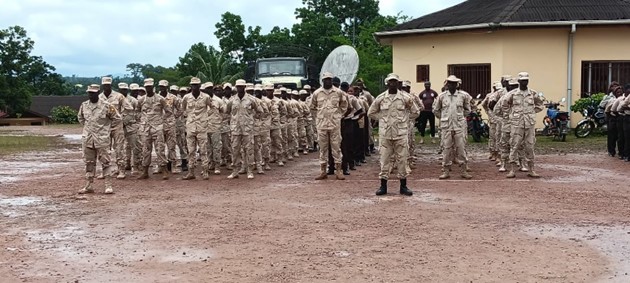“Registration procedures improved during Phase 2 of the BVR process, but the
malfunctioning of equipment still persisted”
This ECC preliminary update covers findings from 184 reports over 5 days of deployment from April 21-May 9, 2023. It also contains critical incidents observed and recommendations to improve the process.
Overall, the ECC observed that registration centers generally opened on schedule during phase two of the BVR process and with the necessary BVR kits available. Despite this, several of the centers observed continued to experience malfunctioning of equipment. ECC observers however, noted an improvement in the way NEC registration staff requested verification of eligibility prior to enrolling applicants during phase two. While the ECC recommended an increase in security presence at registration centers to cover phase two of the BVR, a relatively low security deployment was again observed, even though slightly higher than phase one. Political party representatives were present to observe the procedure in 131 of
the 180 centers that the ECC observed, which is also an improvement over phase one. Voter trucking was observed during phase two.
Preliminary Findings:
The ECC preliminary findings focus on key issues observed over the period of April 21 to May 9, 2023. ECC observers covered the entire process of registration from set-up to closing of centers. During this period, the ECC observed the following:
Opening: ECC observed that 160 of the 185 centers opened on schedule between 8:00 am
and 8:30 am, which is 86% of all the centers. Only, 11% of these centers opened after 8:30
a.m. as a result of the late arrival of staff, the lack of ink for the printer, shortage of cards, or a
lack of electricity to power the equipment.
Set-up: During set-up, BVR centers observed by ECC were seen to have a complete BVR kit
available. Additionally, these centers were generally accessible, that is applicants did not have
to go upstairs to access the center. According to observers’ accounts 131 of 183 centers were
accessible to everyone, including those with special needs or disabilities. The use of canopies
or tents on election day is highly encouraged to improve upon this strategy to facilitate easy
accessibility for people with special needs.
BVR Equipment Functionality:
In 55 of 182 centers observed by the ECC, the equipment malfunctioned but was swiftly fixed; however, the malfunctioning equipment in 14 centers resulted in significant delays.
Applications of Registration Procedures: ECC observers noted an improvement in the way NEC registration staff requested verification of eligibility prior to enrolling applicants during phase two. In 153 of 181 centers, applicants were required to present identification to prove their eligibility to register (often a former voter registration card), and in 178 of 182 centers, applicants’ fingertips were marked with the permanent ink once they successfully registered.
Closing: In general, ECC observers reported that applicants in line at 5:00 pm were permitted to register before centers closed for the day.
Security: While the ECC recommended a stronger security deployment to cover phase two of the BVR, a relatively low security deployment was again observed, even though slightly higher than phase one. 107 of 185 centers observed were reported to have uniformed security personnel present throughout the day.
Party Agents: Political party representatives were present to observe the procedure in 131 of the 180 centers that the ECC observed, which is an improvement over phase one. However, when it comes to high agent deployment, the Coalition for Democratic Change (CDC) and the Unity Party (UP), continue to hold the top spots.
BVR Challenges & Critical Incidents: Equipment failure and cases of voter trucking by aspirants were still notable challenges and occurrences reported by ECC observers during phase two. Others include failure to present printed voter registration cards to processed applicants due to card shortages or printer malfunction and failure to complete rejection forms for those who were turned down. Additionally, there were instances of the voter registration process being interrupted at a few locations due to disturbances made by either party supporters or regular applicants.
Equipment failure & shortage in BVR cards: During the observed period, ECC received reports of critical incidents involving equipment failure or malfunction and shortage in BVR cards. This caused the process to be significantly delayed in some cases and shut down for the full day in others. The affected centers’ names, area codes, and locations are listed below:
· Bong electoral district 01-Palala Public School with center code 06046;
· Bong electoral district 02-MD Massaquoi high school with code 06238;
· Bong electoral district 06-Martha Tubman School with code: 06026;
· Bong electoral district 07-Kristen Marie high school with center code 06170
· Lofa electoral district 01- Fassapoe town hall, Foya with center code 21020;
· Nimba electoral district 08-Kpoahpa Whenten Public School with center code 33181
Voter trucking: Applicants were seen being trucked for the BVR phase two in the counties of Bong, Lofa, Nimba, and Grand Kru, according to ECC observers. Since the start of BVR phase two, candidates have engaged in open voter trucking, and neither the NEC nor the Ministry of Justice has taken any action to stop this serious electoral violation. Below are documented instances of trucking reported by ECC observers:
- Lofa electoral district 01- Foya, at Sengar Palava hut with center code 21083: ECC observer reported the trucking of voters to the registration center, orchestrated by Representative Thomas P. Fallah. The group was intercepted by citizens who attempted to stop them from registering, which interfered with the registration process.
- Bong electoral district 03- Meleki Town hall with center code 06085: Motorbikes and Kehkeh were seen transporting applicants to the registration center. ECC observer received reports that this act was being financed by Representative Melvin Cole office in Monrovia.
- Nimba electoral district 05: Aspirant James Somah, was reported to have trucked applicants in a pickup from Ganta district 1 to Yao Lehpula, district 5 which resulted in a tragic motor accident leading to death of atleast three persons, leaving several wounded.
- Nimba electoral district 07- It was reported that aspirant Musa Bility was involved with trucking of applicants to Saclepea who were non-inhabitants.
- Grand Kru County: ECC received reports of Electoral district 01 candidate Alfred Boe and Senate Pro-Tempore Albert Chea being allegedly involved with voter trucking in Grand Kru from Maryland and other areas of the country.
Reports of Underaged Registration from Grand Kru: Reports of applicants’ registration who are thought to be juveniles or underage have been verified and confirmed by ECC observers within Grand Kru. The Lutheran Church, with center code 18018, as well as others in the county, have been impacted by such incidents. The testimonies of these children’s parents, who served as witnesses and attested to their eligibility as required by the NEC’s Regulation, led to the incidents. The NEC Magistrate issued additional instructions to registrars, instructing them to ask parents who visit the facility to certify the age of their
children to sign a bond before proceeding with the registration in order to regulate the situation.
Recommendations: The ECC proposes the following recommendations for consideration:
NEC:
- That the NEC extends the registration period for at least a week in areas where registration was delayed due to the malfunctioning of equipment. This will compensate for the loss of time.
- In order to increase transparency, ECC requests that the NEC make arrangements for the attendance of political parties and local, national, and international observers during the downloading of phase two data.
- That the NEC alerts the public to the timing of the release of phase two preliminary results
- Lastly, the NEC is encouraged to equally publish the phase two results disaggregated by electoral districts.
Political Parties:
- Political parties and aspirants are advised to lodge a formal complaint with the NEC if they have concerns about phase two or the outcomes of the process.
- That the agents of political parties continue to observe the remaining electoral processes to enable their confidence in the electoral outcome
Security:
That the security forces investigate and apprehend individuals responsible for the trucking of
voters and ensure that they are accorded due process in keeping with the law.
ECC Observation & Deployment Methodology:
On April 21, 2023, ECC began observation in the 37 electoral districts and all nine counties1 of phase two of the Biometric Voter Registration (BVR). 37 of the 49 long-term observers that ECC trained and sent out were stationed observers at particular voter registration locations within their respective districts. To witness the objections and appeals procedures, ECC observers were also present at the NEC Magistrate offices.
The BVR process has been observed by the ECC using both stationary and mobile observation methodologies:
Stationary Observation: County coordinators and district observers were deployed by ECC as stationary observers for the BVR observation. County coordinators monitored the objection and appeal procedures related to voter registration at the National Elections Commission (NEC) magisterial offices, while ECC district observers monitor designated voter registration centers. During the whole voter registration period, county coordinators observed for eight days (8) and electoral district observers for six days (6) at their designated locations. On each day of the deployment, observers submitted a report using a thorough checklist, followed by any critical incidents they may have seen.
Mobile Observation: All ECC county coordinators and district observers were also charged to roam within their respective counties and districts during non-stationary days, reporting any critical incidents observed. This indicates that in addition to the 184 centers covered, ECC observers were able to collect information from other areas of their respective districts and counties while moving around.
The ECC trained data clerks stationed at the ECC Data Center in Monrovia are responsible to verify and confirm each incident that is reported to the ECC Data Center. Using coded messages, observers’ reports are sent to the ECC reporting system via their mobile phones, where they are later analyzed to create updates.
About ECC
The Elections Coordinating Committee (ECC) is Liberia’s largest domestic election observation network with diverse competencies, experiences, and expertise in democracy, elections, and governance established since 2010. ECC’s members include the Center for Democratic Governance (CDG); Center for Media Studies and Peace Building (CEMESP); Center for Conflict Prevention and Peacebuilding (CECPAP); Institute for Research and Democratic Development (IREDD); Naymote Partners for Democratic Development (NAYMOTE-PADD); West Africa Network for Peace Building (WANEP), and the Women NGO Secretariat of Liberia (WONGOSOL). The ECC election observation effort is made possible by the generous support of the American people through the United States Agency for International Development (USAID). “The contents of this update are the responsibility of the ECC and does not necessarily reflect the views of USAID or the United States Government.”







